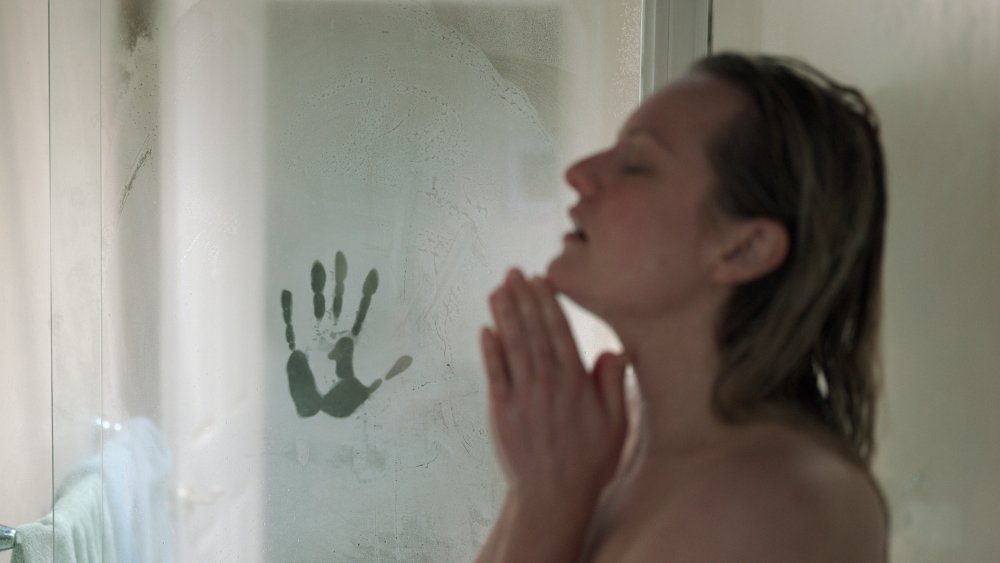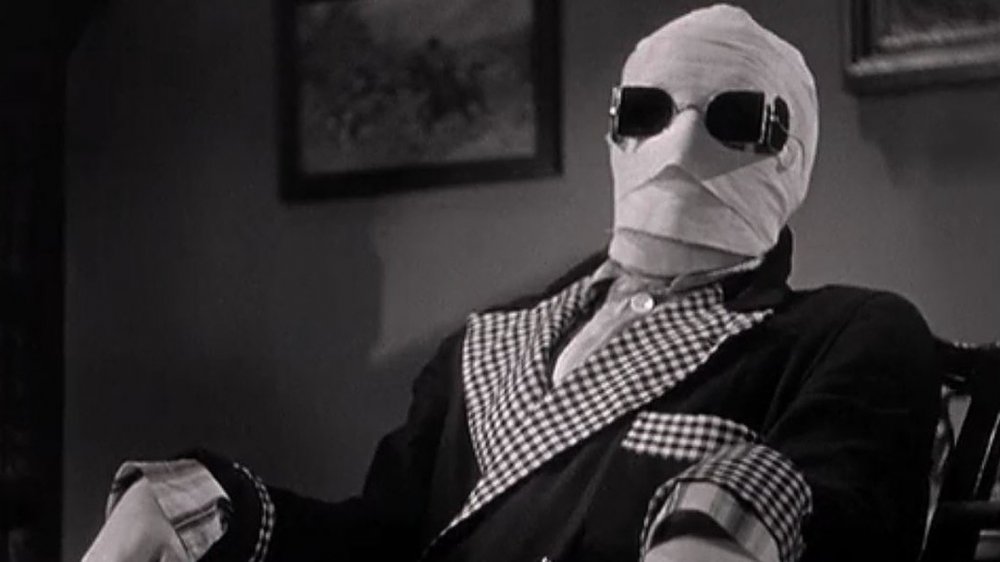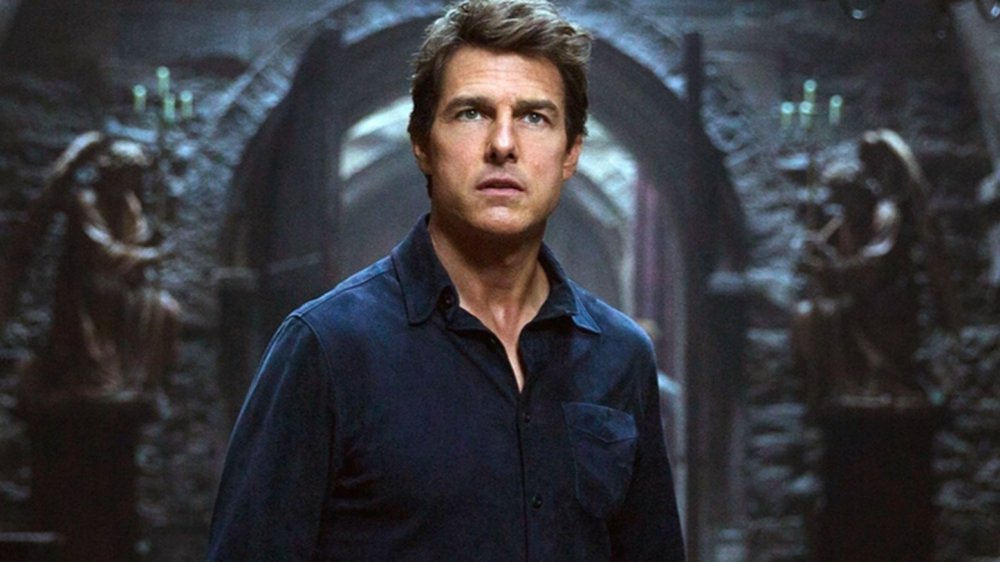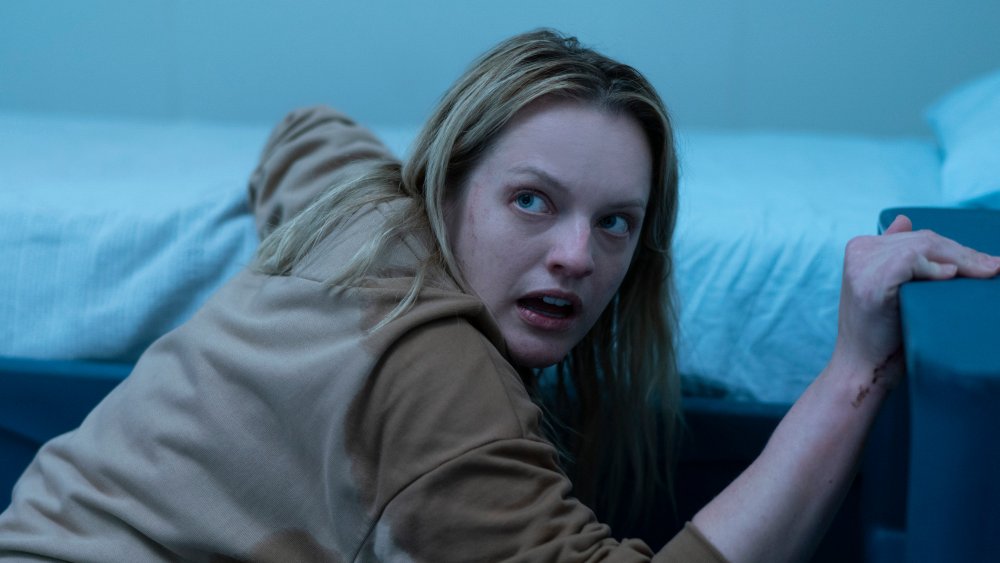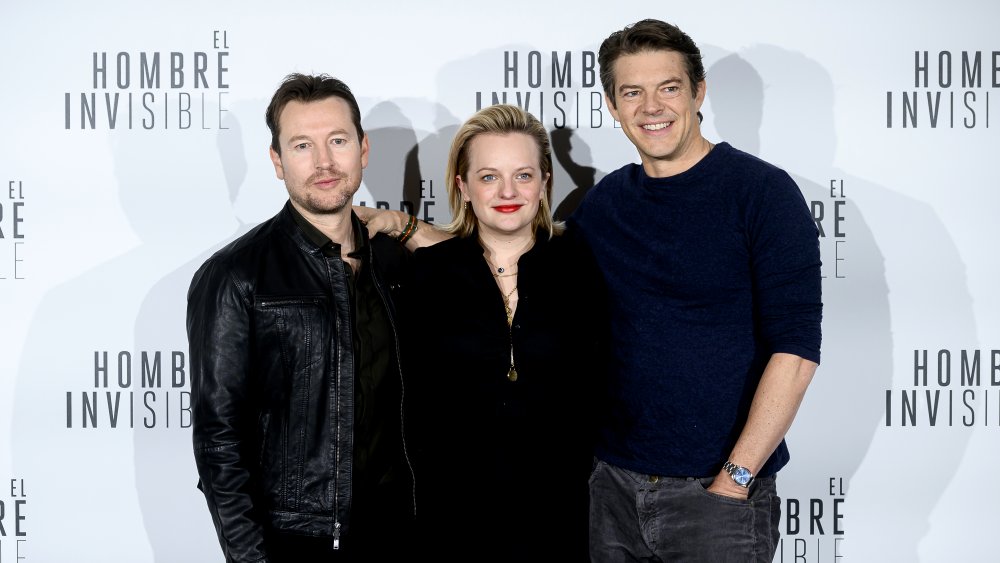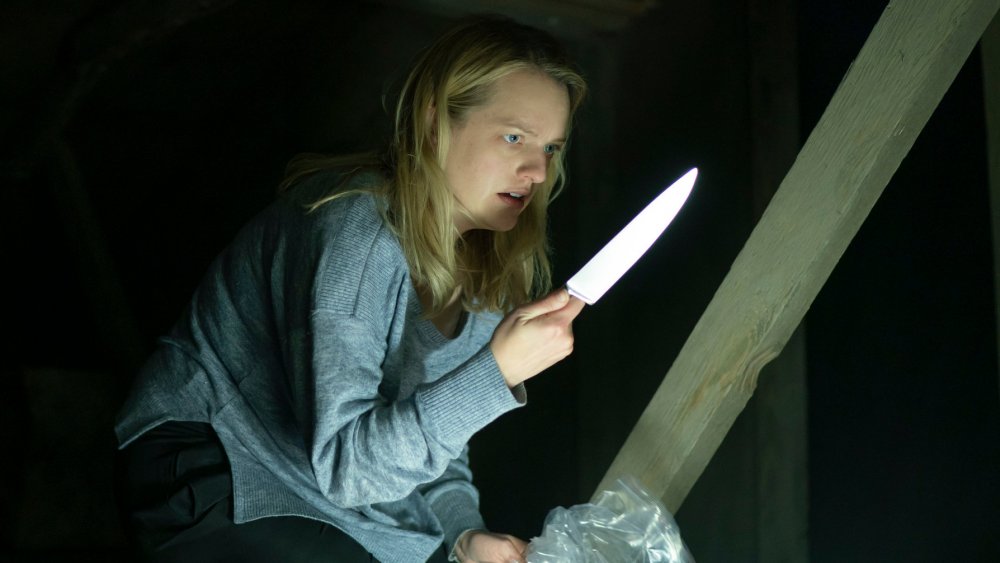The Real Reason The Invisible Man Is Such A Success
2020 will go down as one of the most eventful years in all of human history. Before film productions shutdown, lockdowns were mandated by world governments, and the entire planet basically fell to pieces, a handful of movies managed to see their intended release. Of the few that trickled out into cinemas, The Invisible Man was one — and boy, are we glad it did.
Written and directed by horror maestro Leigh Whannell (of Saw and Insidiousrenown), The Invisible Man as a project began long ago: It was trapped in production limbo for well over a decade. As early as 2006, Universal Pictures brought David S. Goyer in to work on the screenplay. Plans unfortunately fell through, and the project sat dormant for 10 years until progress continued on it once again. In 2016, Johnny Depp was in talks for the lead role (via Deadline). But after 2017's The Mummy — the film intended to kick off Universal's franchise of reboot movies centered on classic movie monsters — performed horribly, the studio overhauled The Invisible Man, bringing in Whannell as the writer and director and Elisabeth Moss (Mad Men) and Oliver Jackson-Cohen (The Haunting of Hill House) to lead.
After a long and tedious journey, The Invisible Man hit theaters on February 28, 2020 to resounding success. It grossed $124 million worldwide on a modest $7 million budget (that's an 18:1 ratio of earnings to cost), and received high praise from critics across the board.
So, what about The Invisible Man made it so critically and commercially successful? There's no singular entity that can take the credit for its good fortune; rather, a combination of factors led to The Invisible Man becoming a huge win for Universal.
2020's The Invisible Man effectively modernizes a classic property
The first movie centered on the Invisible Man was released way back in 1933, adapted from H.G. Wells' science fiction novel. While it's a classic by all accounts and helped put the Universal horror brand on the map, the James Whale-directed feature is very much of its time. In it, Dr. Jack Griffin (Claude Rains) becomes invisible through chemistry and drug use, planning to take over the world with his latest breakthrough. The original '30s flick is entertaining — as are the many takes that came in subsequent years, ending with 2000's Hollow Man — but likely wouldn't do well with modern audiences. An adaptation for 2020 audiences would need much more to take it from a simple translation to a modernization.
Instead of doing a copy-paste job with the original for his version of The Invisible Man, Whannell took the story and characters in a vastly different direction. The titular villain here is an egregiously wealthy optics engineer named Adrian Griffin (Oliver Jackson-Cohen), whose invisibility is instead an illusion created with technology used only to torment his ex-girlfriend, Cecilia Kass (Elisabeth Moss). This take on the villain is more believable and resonated more strongly in today's tech-based world. The sci-fi elements were tweaked and the horror aspect of the story was more reality-based, centering on a toxic, abusive relationship from which Cecilia escaped.
There wasn't the baggage of a wider cinematic universe holding The Invisible Man back
As mentioned, in 2017, Universal released its first attempt to revitalize its classic monster movies for a modern audience, and there was a plan in place to bring some of pop culture's most iconic creatures together a lá 2012's The Avengers. The issue: Universal's first Dark Universe installment, The Mummy, wasn't a resounding success. While it did decently at the box office, grossing nearly $410 million worldwide on a roughly $195 million budget, critics and audiences ravaged it.
The Dark Universe was off to a bad start for one major reason: It went overboard with its set-up in The Mummy. The allusions and teases for other iconic characters and long-winded exposition suffocated the film. Thankfully for the studio, it learned its lesson ahead of The Invisible Man, dialing back from the shared universe plan. This streamlined approach made The Invisible Man easier to view and vastly more entertaining without the weight of a failed predecessor on its shoulders. The flick kept its scope tight, allowing the story to stand on its own.
Elisabeth Moss' performance in The Invisible Man is unforgettable
While the titular character is Jackson-Cohen's Adrian Griffin, he's far from the standout member of the cast. (He only appears in the flesh at the beginning and end of the movie.) That honor belongs to Moss as Cecilia Kass, the abused ex-girlfriend of the supposedly dead Adrian. As The Invisible Man goes on, Cecilia breaks down due to Adrian's undercover torture. Even her closest friends and her own sister question Cecilia's sanity, driving her even further to figure out the mystery of Adrian's apparent suicide.
This isn't a calm, stoic portrayal to pull off — Cecilia is on-edge and ready to snap at a moment's notice. Moss played this personality to perfection, making even the audience wonder if the events of the film were all inside her head. Combined with the disheveled appearance and tense mannerisms she brought to her performance, Moss was the total package. The focus was truly on Moss' Cecilia — and not just because her ex was invisible and the supporting cast was infrequent on screen. Moss is just that dang good.
Blumhouse Productions gave The Invisible Man its signature touch
Universal didn't act alone in bringing The Invisible Man to the big screen: It teamed with Blumhouse Productions for the project as well. The two companies signed a 10-year first-look deal in 2014, allowing for collaboration on some of Universal's in-progress horror features. Together, the companies have released such movies as 2018's The First Purge and Get Out from the year prior, among others. Blumhouse's body of work speaks for itself, so when it hopped onto The Invisible Man, it seemed like a natural fit.
Jason Blum's production company is proficient in the horror genre, as evidenced by its extensive body of work. Tying it to The Invisible Man was a smart move on the part of Universal; both entities understood the tone the film needed to strike and how to best present it. Their creative input saved what could have been another Mummy had the studio chosen to tackle The Invisible Man on its own.
The Invisible Man didn't face any serious competition in theaters
The early 2020 movie season didn't come out of the gate with any major blockbusters. February's biggest releases, aside from The Invisible Man, were Sonic the Hedgehog and Birds of Prey (and the Fantabulous Emancipation of One Harley Quinn). The former was a family-friendly, kid-targeted movie centered around a video game character, so the target audience wasn't all that large. The latter, while a comic book adaptation from DC and Warner Bros., did well with critics and audiences (it's Certified Fresh on Rotten Tomatoes) but didn't rake in a ton of money at the box office. That left Leigh Whannell's suspense thriller in a league of its own.
Naturally, with no major competition in the way, The Invisible Man came out on top. To this day, the film still crushing financial records with no opposition. With few theaters open at the moment, the ones in operation are still screening the Moss-led film. As of June 15, 2020, The Invisible Man stands at #1 at the box office in its 16th weekend.
